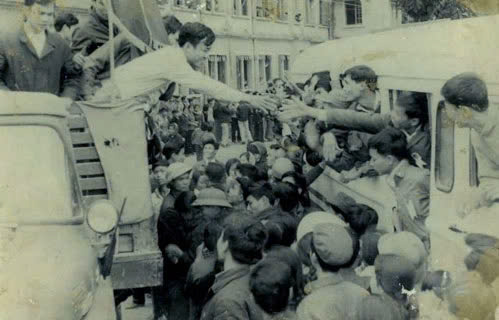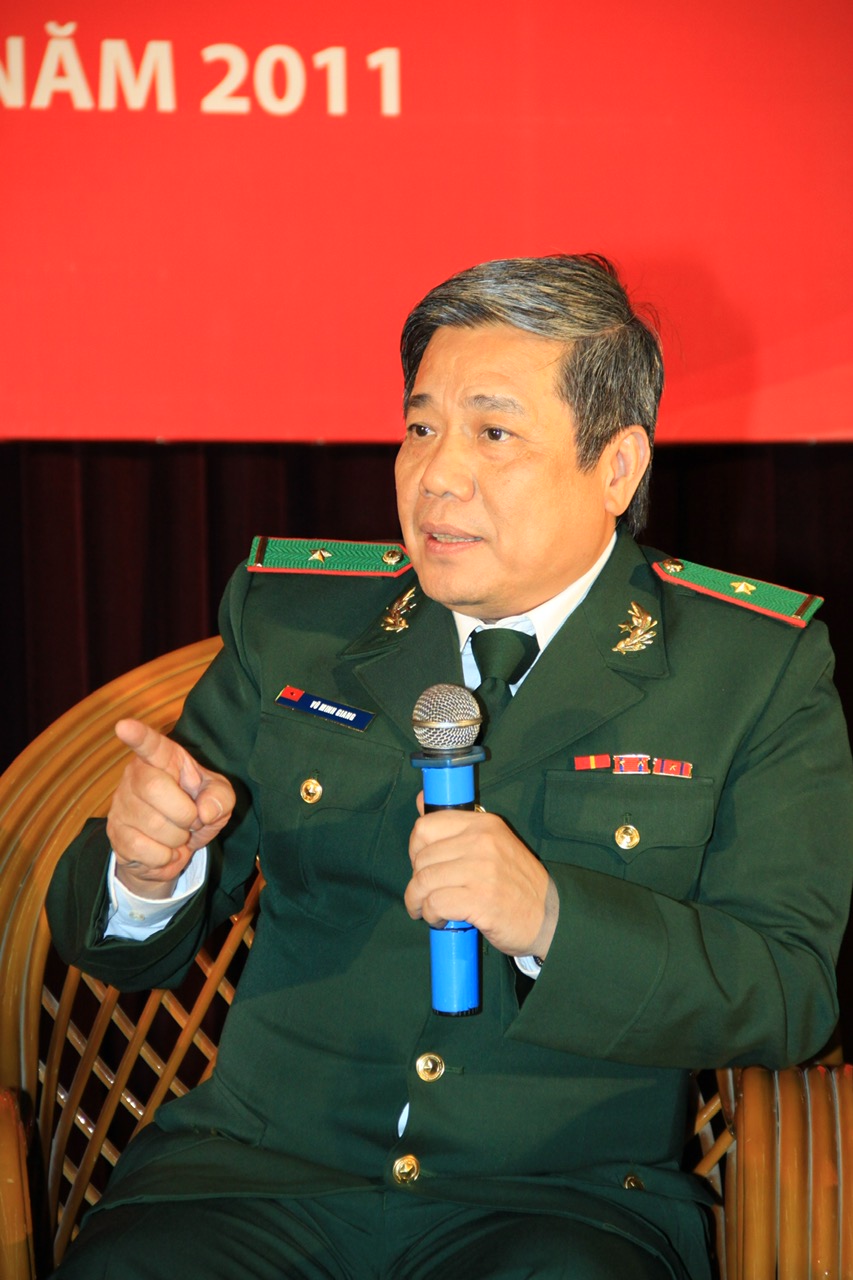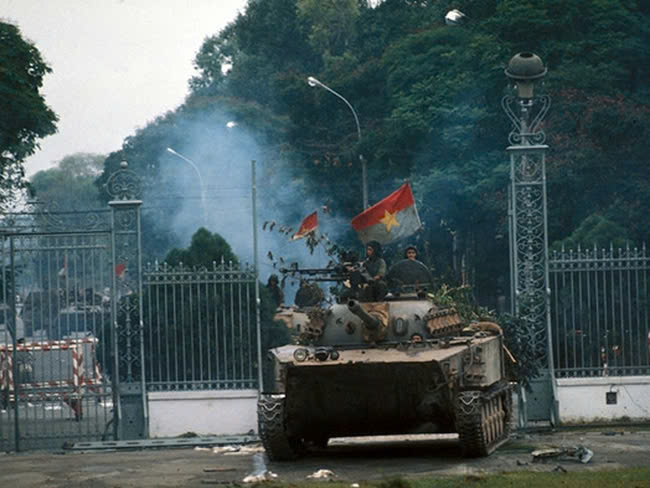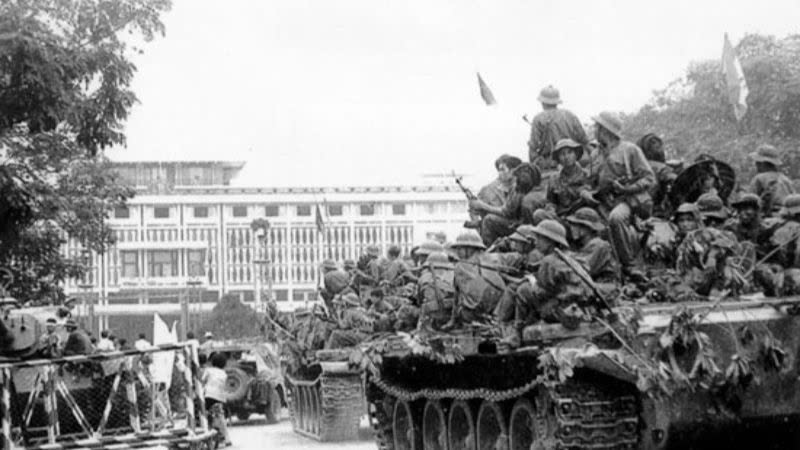Vietnam has long been known as a resilient, indomitable nation and is famous in world history for its unprecedented feats. Rising up to escape the yoke of more than a thousand years of Northern feudal domination, a unique phenomenon in human history, the Vietnamese people have steadily risen in the era of Dai Viet civilization and won three great victories against the Mongol-Nguyen empire, the most powerful and aggressive army in the world in the 13th century, proving the comprehensive strength of that civilization.
During more than a thousand years of independence, Vietnam has achieved many glorious feats associated with heroic places such as Bach Dang, Chi Lang, Dong Da... But in modern times, a dangerous challenge has come to a nation that has always been proud of its heroic achievements in the past. Unable to keep up with the changes of the times, under the reign of the Nguyen Dynasty, from the second half of the 19th century, Dai Nam gradually sank into a state of backwardness, national power was exhausted, and people's hearts were scattered. After the fall of the capital Hue in 1885, although the Can Vuong movement continued for a short time, the country's sovereignty actually fell into the hands of the French colonialists. It can be said that the long journey of sacrifice and hardship of the Vietnamese people to regain independence began here. That cause had to go through a long journey of 90 years, until 1975 when it was completely completed.
The great victory in the spring of the year of the Cat was a miracle, the pinnacle of glory for the Vietnamese people in their fight against foreign invaders. The value of the victory was unparalleled, but the price to pay was also immeasurable. Millions of people fell in the two wars. The country was heavily devastated and the multifaceted consequences of a long, fierce war became a burden that was not easy to overcome immediately after the gunfire stopped. That is not to mention the invisible but real difficulties of separation, even division within the nation when one country had two regimes and a large part had collaborated with the invading armies. Reconciliation and harmony could not be carried out easily in a day or two, especially in the context of a divided world, with turmoil in almost every country being caught up in international conflicts... The great victory was the pinnacle of the tradition of indomitable resilience, becoming a message to the whole world, especially countries with hegemonic plots, that Vietnam is a nation that cannot be subdued. Glorious victory becomes a value that contributes to the country's position today.
The great significance of the Ho Chi Minh campaign did not stop at a military victory, however great. The historical significance of this event was multiplied because the aspiration for national unification, a sacred wish of the entire nation, was realized.
If the special geo-strategic position has made the country always face the threat of foreign invasion, successive generations have had to struggle to fight against powerful and brutal invaders, the narrow terrain stretching from North to South is a natural condition that is easily exploited by forces with the intention of division. Before the Ben Hai River became a temporary border after the Geneva Agreement in 1954, the two regions of the North and South had been separated for centuries during the Trinh - Nguyen war. It was thought that the 17th parallel would no longer be a dividing line and the country would be reunited after a general election was held in the spirit of the Geneva Agreement, but that did not happen. The situation became extremely dangerous and serious because the long-term division of Vietnam was in the calculations of the great powers.
After April 30, 1975, the entire nation enjoyed the joy of victory and fulfilled the desire for national reunification. Years will pass, but the victory of our people in the resistance war against the US to save the country will forever be recorded in the history of the nation as one of the most brilliant pages, a shining symbol of the complete victory of revolutionary heroism and human intelligence, entering world history as a great feat of the 20th century, an event of great international importance and profound spirit of the times. It was also a day of reunion for tens of millions of families. The reunification of the country was not only a great spiritual victory but also created the premise for the next strong steps of development. What we have today was created directly from those historic days at the end of April.

In the joy of celebrating the half-century anniversary of the historic festival, VNU is also extremely proud of its valuable contributions to the common cause of the whole nation. This is a place that has always received special attention from the Party and the State. Right from the time of gaining independence, just over two months after the inauguration ceremony of the Provisional Government at Ba Dinh Square, on November 15, 1945, President Ho Chi Minh personally presided over the opening ceremony of the first course of Vietnam National University, a multidisciplinary, multi-field university that had just been reorganized under the Democratic Republic of Vietnam. Continuing that tradition, Hanoi National University, the leading bird of Vietnamese higher education, has been continuously visited by Party and State leaders to encourage, assign important tasks and create favorable conditions to complete the tasks. In particular, it is worth mentioning the events in which the University was honored to welcome President Ho Chi Minh. Accompanying President Ho were heads of state such as Chairman of the Supreme Soviet of the Soviet Union Voroshilov (1957), President of India R. Praxát (1959), and President of Indonesia Sukarno (1959).
With the mission of training talents and conducting basic scientific research, the foundation for the entire science of the country, Hanoi National University was also personally assigned by Prime Minister Pham Van Dong to nurture talents and open a specialized system to train many generations of excellent scientists in the future. The Mathematics specialized block was established in 1965, in the midst of the fierce war against the US to save the country. At that time, the Party and State leaders had a policy of selecting and training excellent students and good scientists to prepare human resources for the cause of building and defending the Fatherland.
The contributions of the staff and students of VNU units do not stop at the professional and academic fields but are also the achievements of the staff and students who rushed into the fire and bullets on the battlefield. During the fierce war years, teachers and students not only studied well but also went to the front to directly participate in the fight. During the years of studying against the Americans to save the country, from the lecture halls of Hanoi National University alone, 1,333 staff and students put down their pens and went to war. They fought bravely for the Fatherland and many fell in the trenches like heroes. The whole country knows the name of poet Le Anh Xuan (Ca Le Hien), a son of the uprising homeland of Ben Tre, who was a student and then a lecturer in the History department. He volunteered to fight in the South when he was just 24 years old and heroically sacrificed himself when he was only 28. He was posthumously awarded the title of Hero of the People's Armed Forces and his immortal works, including Vietnamese Posture, were awarded the State Prize for Literature and Arts. His name has been given to streets in Hanoi, Ho Chi Minh City, and Quang Binh.
At the same age as Ca Le Hien is Chu Cam Phong (Tran Tien). After graduating from the Faculty of Literature, Hanoi University, he was also allowed to stay at the school to be trained as a lecturer, but he was determined to return to the South to fight and heroically sacrificed himself right on his homeland. Moved by the brave example of the Quang Nam student, Professor Ha Minh Duc, who used to be his teacher, said: "Time does not pass quietly but records heroic examples, and Chu Cam Phong is one of those heroic individuals, a pride of Hanoi University". During the difficult and fierce days, Chu Cam Phong still continued to compose and left behind for the world outstanding works of poetry and literature. Later, they were collected in a book of nearly a thousand pages under the title War Diary. His works were awarded the State Prize for Literature and Arts and he was posthumously awarded the title Hero of the People's Armed Forces.
Among the students who died for the cause of liberating the South and unifying the country, there was a shining example. That was the heroic martyr of the People's Armed Forces Hoang Kim Giao. The young man from Hai Phong was a student of the 6th class (1961 - 1965) of the Physics Department, Hanoi University of Science. After graduating, he was assigned to work at the Technical Research Department, under the General Department of Logistics - Ministry of National Defense. Due to his early outstanding ability, he was sent to study in the Soviet Union. But at that time, the destructive war entered an extremely fierce period. Millions of tons of bombs and ammunition, including magnetic bombs and mines, were dropped, causing traffic and transportation to the battlefield to be blocked, significantly affecting the resistance war.
Faced with that situation, Hoang Kim Giao had a research topic using electric fields to destroy magnetic bombs. In the war conditions with many shortages, he went directly to the front line of Zone 4, where the destructive war of the American empire was most fierce, and with some teammates successfully experimented on his topic right in the land of fire... Applying the research results into practice, he directly faced death hundreds of times and personally destroyed 72 time bombs, including 40 magnetic bombs. But at the end of 1968, Hoang Kim Giao heroically sacrificed himself at the age of 27 when many plans and dreams about research projects were still unfinished...
The project: "Breaking magnetic mines and magnetic bombs, ensuring traffic 1967 - 1972" by Hoang Kim Giao was awarded the Ho Chi Minh Prize for Science and Technology, Phase I (1996).
Along with those years, there are many brothers and sisters who will forever remain on the battlefield. The school and friends still mention the names of Nguyen Trong Dinh, Ngo Van So, Pham Ngoc Tuan, Nguyen Van Thac... Each person has a different personality, but all the students who went to the battlefield were very similar in their optimism and romanticism. Until now, no one has been able to explain why Nguyen Van Thac, in a letter written to his lover in 1971, said that he would answer his girlfriend's question "What is happiness?" on April 30, 1975 (?). How wonderful!
You are the excellent students of the school who did not have a day to reunite with friends and relatives, but you heroically sacrificed for the cause of national liberation. To the Fatherland, you are immortal at the age of twenty. To the school, your names will forever remain in the glorious tradition of the beloved Hanoi National University.
After the complete liberation of the South, a mountain of work arose beyond imagination. One of them was to take over and reorganize the universities in the South. At the request of the Ministry of Universities and Vocational Secondary Schools, Hanoi University established a delegation to organize classes for teachers and students of the two universities, the Faculty of Letters and the University of Science (later reorganized into Ho Chi Minh City University). After many rounds, Hanoi University sent 112 cadres to reinforce the universities in the South, including 12 leaders and 100 lecturers (31 with associate doctoral degrees).
The students of the University of Literature and the University of Science, two large universities in Saigon, still remember clearly the image of two teachers from the North who came to take on the task of managing the school. Both came from Hanoi University of Science. Holding the position of Deputy Director of the University of Science, then the first Principal of Ho Chi Minh City University of Science, was Associate Professor, Dr. Ly Hoa, a son of the Mekong Delta, who was injured in the resistance war against the French and then trained and matured in the field of Physics. The person assigned the important responsibility of Head of the Executive Board of the University of Literature was Professor, Dr. Phan Huu Dat, former Head of the History Department, Hanoi University of Science. Along with the two teachers, many other cadres of the school were sent to the South to participate in management work such as Associate Professor, Dr. Nguyen Quoc Loc as Vice Principal of Hue University of Science, Associate Professor, Dr. Nguyen Gia Phu as Head of the History Department, Da Lat University, etc.

A fourth-year student of the History Department at the University of General Sciences, Vu Minh Giang enlisted on January 10, 1972, when the war entered its most fierce period.
Half a century has passed, but every time we celebrate the great victory day, the festival of the whole nation, joyfully recalling the milestone of the country's reunification, every Vietnamese person is filled with sacred emotions mixed with pride and deep gratitude to those who sacrificed themselves for the country. In the common victory, VNU has made proud contributions. The whole country is facing a new opportunity of the era of rising up, the glorious history will be a solid foundation for us to step up to the stage of glory, realizing the aspirations of many generations and the wish of President Ho Chi Minh: Vietnam must rise up to stand shoulder to shoulder with the great powers of the five continents.



